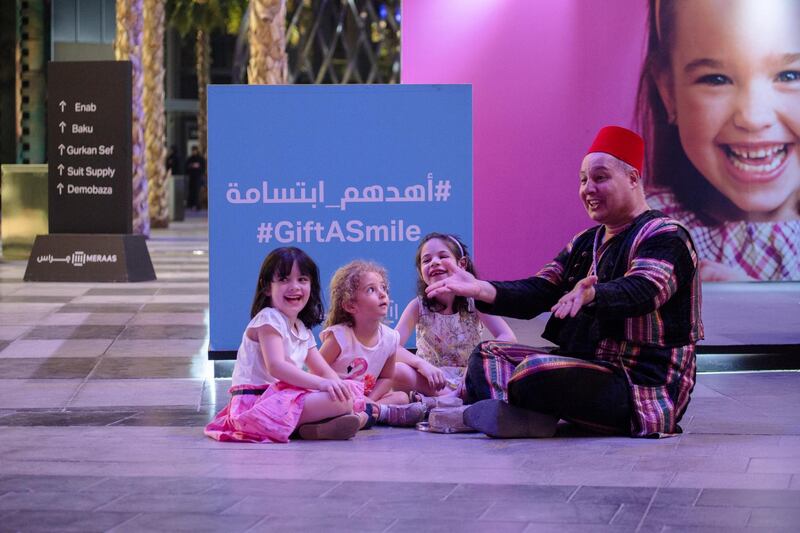Modern glamour and old traditions come together this week as part of the Hakawati storytelling sessions.
Running throughout Ramadan, the initiative is set to conclude this weekend with children able to hear much- loved Arabic stories told live in special pop-up libraries in Dubai hot spots City Walk, Al Seef and Boxpark.
In addition to the classic tales, the pop-up locations are also a place to donate books, toys and clothes which will then be distributed accordingly by the Dubai charity Beit Al Khair Society. "It is a wonderful programme and I like how it brings all these various aspects together," says Nemer Salamun, who will be running the storytelling sessions.
"The whole aim of this thing, from my perspective, is to bring smiles to faces, and storytelling does that." Salamun understands that well. The Syrian raconteur and stage actor dedicated his career to understanding the power of stories.At the end of the holy month, he will return to his other roles as a playwright and creative therapist.
More than a story
Working with his male clients, Salamun says he is able to help them unlock deep-seated traumas through the prism of a good tale. "It's another way to discuss some of the things that are affecting them but in a way they feel comfortable," he says.
“I find that if you discuss things through stories, it allows you to get to the heart of the matter instead of skirting around the issue.”
When it comes to the Hakawati sessions in Dubai, Salamun explains his goals are more benign. "I am just trying to make children happy," he says. "Stories have a beautiful way of providing comfort to children, and it also takes them away from the troubles of the world."
But as anyone with a passing interest for a good yarn will tell you, it is not so much about what the story is about, but about how you tell it.
_________________
Read more:
How storytelling reveals who we are and creates bonds between us
Ahmed Bukhatir and Ammar Al Azaki discuss their melodies marking Ramadan
Does the cultural boycott of Israel work?
_________________
And this is where Salamun’s theatre training comes into play. Dressed in dark colourful robes and a tarboush (Ottoman era cap), each session has him sitting cross-legged with children – while parents watch on from benches not far behind – as he gesticulates and summons different voices for his set of characters.“That is an art in itself,” he says.
“As a stage actor we always deal with stories. They are the source material and it is about how we can express them to the audience. There is a skill to everything; to tell a story and to even listen to one are separate arts.”
When it comes to the stories themselves, they are a mixture of old favourites as well as those he self-penned or improvised. “Some of them are traditional ones that we grew up with as kids, while others are educational and I would occasionally use my own stories as well,” he says. “But I am pretty open when it comes to this and I am happy to source these stories from anywhere as long as they entertain and enchant in a way.”
Keeping the Arabic language alive
But they may fulfil a more important purpose than entertainment. With Arabic scholars and authors fearing the language may become obsolete in future generations, inspiring a love of Arabic among children through stories could be an important way to safeguard the language.
This is the reason why Salamun hopes the Hakawati programme will continue after Ramadan, in whatever shape or form.
The creative and continuous interaction between children and the Arabic language could provide untold benefits in the long term, he explains. “This is an ongoing discussion regarding the state of the Arabic language.
“Now there have been some people who suggested that what the language needs is a sense of development, but I don’t necessarily share that view. It’s about maintaining it in our daily lives because it is eroding each day, particularly through social media. Storytelling is just one of the many things needed to keep the language alive.”
The Hakawati storytelling sessions will be held at City Walk on Thursday, Al Seef on Friday and Boxpark on Saturday from 9pm to 10pm






